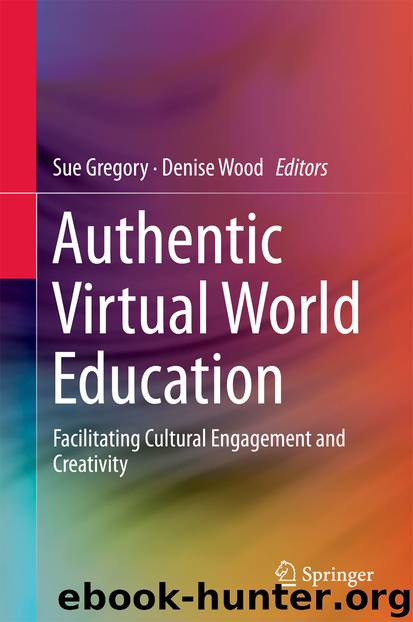Authentic Virtual World Education by Sue Gregory & Denise Wood

Author:Sue Gregory & Denise Wood
Language: eng
Format: epub
Publisher: Springer Singapore, Singapore
Opportunity and Anxiety
International exchange is often viewed as a kind of guarantee of internationalisation and the development of ‘global citizenship’ (Monk et al. 2015). However, as mentioned above, it is important to recognise that reported benefits such as language socialisation, intercultural competence and indeed global citizenship are not, in fact, automatic (Amit 2010; Wilkinson 1998). Rather than being entirely supported by empirical evidence, Amit claims that for the most part, belief in the benefits of student exchange are often underpinned by a longstanding belief in the educative value of travel. Due to a variety of reasons, including practical concerns, such as living in foreign-student only dormitories, or attending special classes, students may have few opportunities to communicate with NSs, as being in a temporary sojourning position itself can make it difficult to integrate (Penn et al. 2013). Even when there is the opportunity for relatively close integration, Bochner et al. (1985) show that simply living in proximity to one another does not necessarily result in the development of relationships.
Similar misconceptions exist in the domain of online intercultural exchange, where, particularly in the early days of internet-based communication, it was assumed that access alone to NSs ‘anytime, anywhere’ would suffice to provide students with abundant opportunities for language learning and use (Blasing 2010). Of course, with no common goal, and no framing, it can be difficult for participants to collaborate (Pasfield-Neofitou 2014). As Leeman (1999) states, while there has been much said about the benefits of computer-mediated communication to increase L2 interaction and production (cf. Gonzalez-Bueno 1998, cited in Leeman 1999) learners (and instructors) do not necessarily know what to communicate about in such settings.
Hanna and de Nooy (2003) traced the journeys of four learners of French on newspaper discussion forums. They discovered that those who viewed the discussion as a form of language practice found it difficult to find willing interlocutors, but those who viewed the activity as participation in a discussion about the topics raised gained cultural knowledge and were able to engage more with NSs. Allen (2003), in a study of American students of French on study abroad in France, also found that while an overall increase in proficiency could be seen to result from time spent in-country, there were also clear examples where disincentives to communicate with locals impacted upon learner motivation.
We hypothesise that students on international exchange may experience a kind of vicious cycle. A lack of opportunities (either prior to departure, or in the country itself) to interact with NSs may exacerbate FLA, and FLA of course may in turn dissuade students from taking up opportunities to communicate with NSs (Wilkinson 1998) which they otherwise may have engaged in if they had more confidence in their language abilities.
Download
This site does not store any files on its server. We only index and link to content provided by other sites. Please contact the content providers to delete copyright contents if any and email us, we'll remove relevant links or contents immediately.
Spare by Prince Harry The Duke of Sussex(5196)
Navigation and Map Reading by K Andrew(5156)
Tuesdays with Morrie by Mitch Albom(4784)
Machine Learning at Scale with H2O by Gregory Keys | David Whiting(4313)
Cracking the GRE Premium Edition with 6 Practice Tests, 2015 (Graduate School Test Preparation) by Princeton Review(4293)
Never by Ken Follett(3955)
Goodbye Paradise(3810)
What It Really Takes to Get Into Ivy League and Other Highly Selective Colleges by Hughes Chuck(3760)
Fairy Tale by Stephen King(3396)
Harry Potter and the Prisoner of Azkaban (Book 3) by J. K. Rowling(3359)
Pledged by Alexandra Robbins(3177)
Kick Ass in College: Highest Rated "How to Study in College" Book | 77 Ninja Study Skills Tips and Career Strategies | Motivational for College Students: A Guerrilla Guide to College Success by Fox Gunnar(3129)
Reminders of Him: A Novel by Colleen Hoover(3116)
A Dictionary of Sociology by Unknown(3085)
Sapiens and Homo Deus by Yuval Noah Harari(3071)
The Social Psychology of Inequality by Unknown(3029)
Graduate Admissions Essays, Fourth Edition: Write Your Way into the Graduate School of Your Choice (Graduate Admissions Essays: Write Your Way Into the) by Asher Donald(2921)
Will by Will Smith(2919)
Zero to Make by David Lang(2783)
